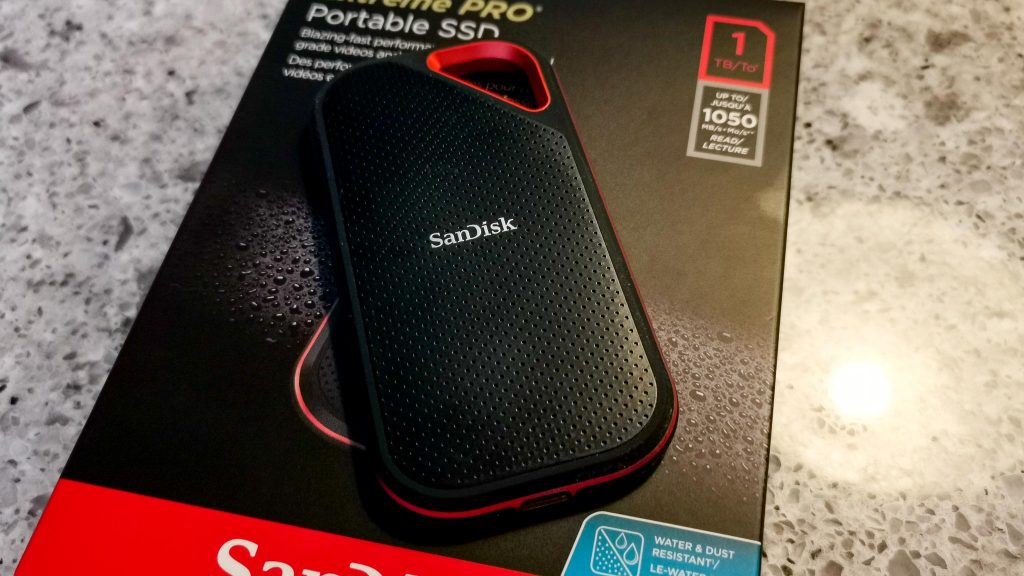So we are going to take a look at a product today that has been out for some time. I have actually had this in my hands for several months and never reviewed it as my first provided sample wasn’t a review sample. The reason I wanted to review it today is because it is a decent example of portable SSD storage and I find that I rely on this quite often. The SanDisk Extreme Pro Portable SSD.
The SanDisk Extreme Pro Portable SSD is available in 250GB, 500GB, 1TB and 2TB and its components are surrounded by a forged aluminum body covered with a black silicon rubber casing that provides for its IP55 water and dust rating. It comes with a 5-year limited warranty and the package itself contains the Extreme Pro Portable SSD itself, a Quick Start manual and two connecting cables, USB Type-C to Type-C and USB Type-C to Type-A.
Inside we find a green PCB containing the ASMedia ASM2362 USB 3.1 Gen2 to PCIe bridge controller Chip which provides for NVMe speeds up to 1050MB/s read and write, as well as an M.2 SSD on the opposite side. The SSD is a standard WD Black SN750 500GB SSD as we reviewed here. Let’s check out a few benchmarks…
ATTO Disk Benchmark is perhaps one of the oldest benchmarks going and is definitely the main staple for manufacturer performance specifications. ATTO uses RAW or compressible data and, for our benchmarks, we use a set length of 256mb and test both the read and write performance of various transfer sizes ranging from 0.5 to 8192kb. Manufacturers prefer this method of testing as it deals with raw (compressible) data rather than random (includes incompressible data) which, although more realistic, results in lower performance results.
CRYSTAL DISK BENCHMARK VER. 7.0.0 x64
Crystal Disk Benchmark is used to measure read and write performance through sampling of random data which is, for the most part, incompressible. Performance is virtually identical, regardless of data sample so we have included only that using random data samples.
THROUGHPUT
IOPS
The toughest benchmark available for solid state drives is AS SSD as it relies solely on incompressible data samples when testing performance. For the most part, AS SSD tests can be considered the ‘worst case scenario’ in obtaining data transfer speeds and many enthusiasts like AS SSD for their needs. Transfer speeds are displayed on the left with IOPS results on the right.The AS SSD results aren’t as appealing as we might like to see but do get a first look at read and write IOPS which appear to be in the general ball park of listed specs.
As we can see by ATTO, Crystal DiskMark and AS SSD, both read and write performance are fairly consistent with posted specifications. The important thing to remember with this type of storage is that it is not intended for use as an operating system where the execution of thousand of small files takes place in a very short period of time. The SanDisk Extreme Pro Portable SSD is intended for storage of such types of media as music, photography and videos. Simply, it is a great little drive.
Checking Amazon right now, pricing appears to be $71.71 (250GB), $89.88 (500GB), $167.95 (1TB) and $299.99 for the 2TB capacity. The best deal when considering price progression just has to be that 500GB!
Check out SanDisk Extreme Pro Portable SSD pricing at Amazon
 The SSD Review The Worlds Dedicated SSD Education and Review Resource |
The SSD Review The Worlds Dedicated SSD Education and Review Resource | 


Basically this external drive contains an nvme with a potential of 3,000MB reads and writes.
Yes great product but you are dead on. The SSD is limited by the ASMedia ASM2362 controller. It would be at a much higher price point if they made that bump to Tbt 3.